Factors Impacting the International Business Environment: A Report
VerifiedAdded on 2023/01/18
|12
|3691
|25
Report
AI Summary
This report provides an assessment of the international business environment, focusing on the PESTEL framework. It examines the impact of political, economic, social, technological, and environmental factors on international business operations. The report analyzes how political stability, economic conditions (such as interest rates and employment), social preferences, technological advancements, and environmental concerns influence business strategies and outcomes. The analysis includes both positive and negative impacts of these factors, supported by examples like Tesco's operations in the UK and other countries. The report highlights how businesses must adapt to varying cultural norms, economic fluctuations, and technological changes to succeed in the global market. Furthermore, it emphasizes the importance of understanding consumer preferences and the implications of factors like health consciousness and technological advancements on business strategies, both regionally and internationally. The report also acknowledges the challenges of unhealthy competition and privacy concerns in the digital age.
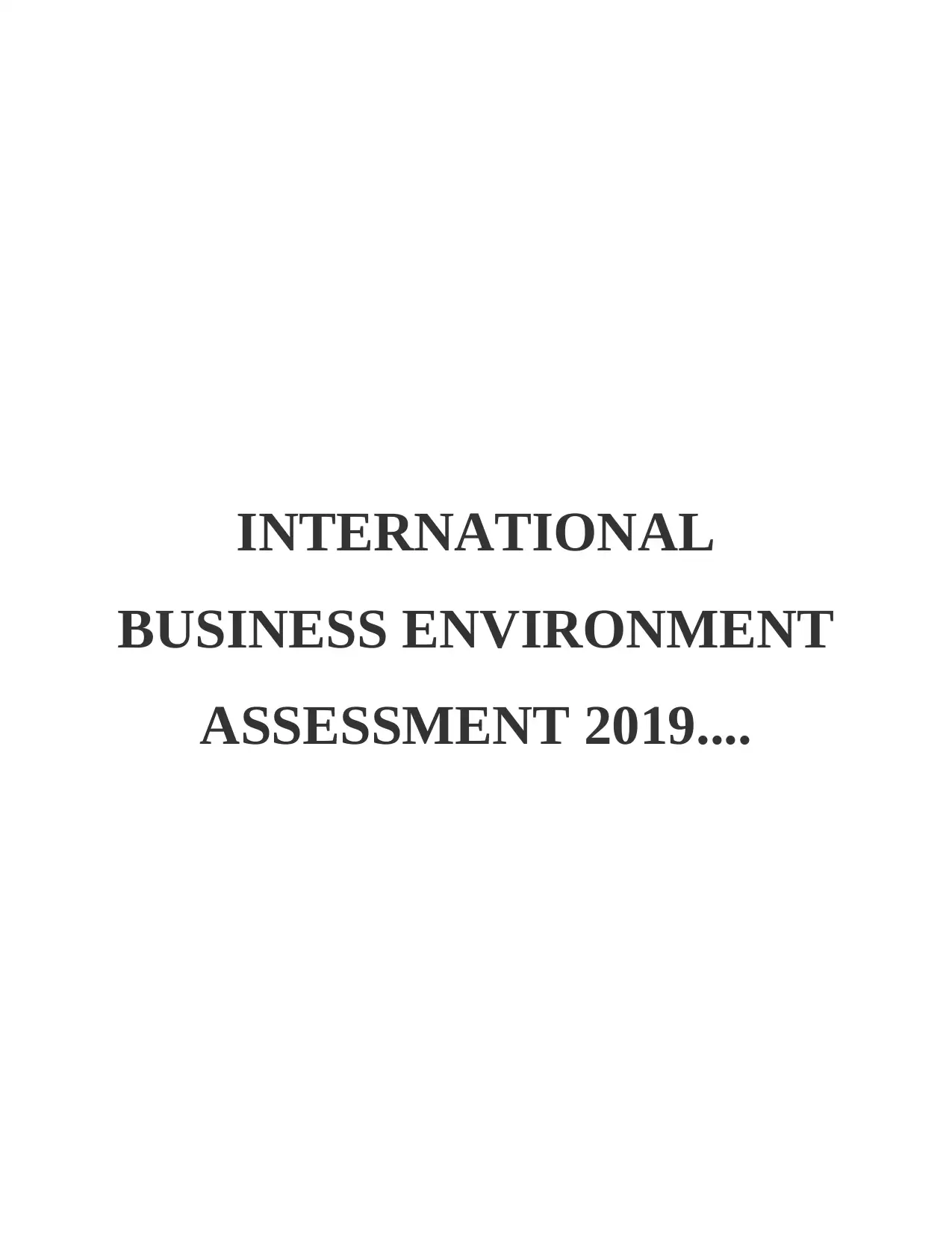
INTERNATIONAL
BUSINESS ENVIRONMENT
ASSESSMENT 2019....
BUSINESS ENVIRONMENT
ASSESSMENT 2019....
Paraphrase This Document
Need a fresh take? Get an instant paraphrase of this document with our AI Paraphraser
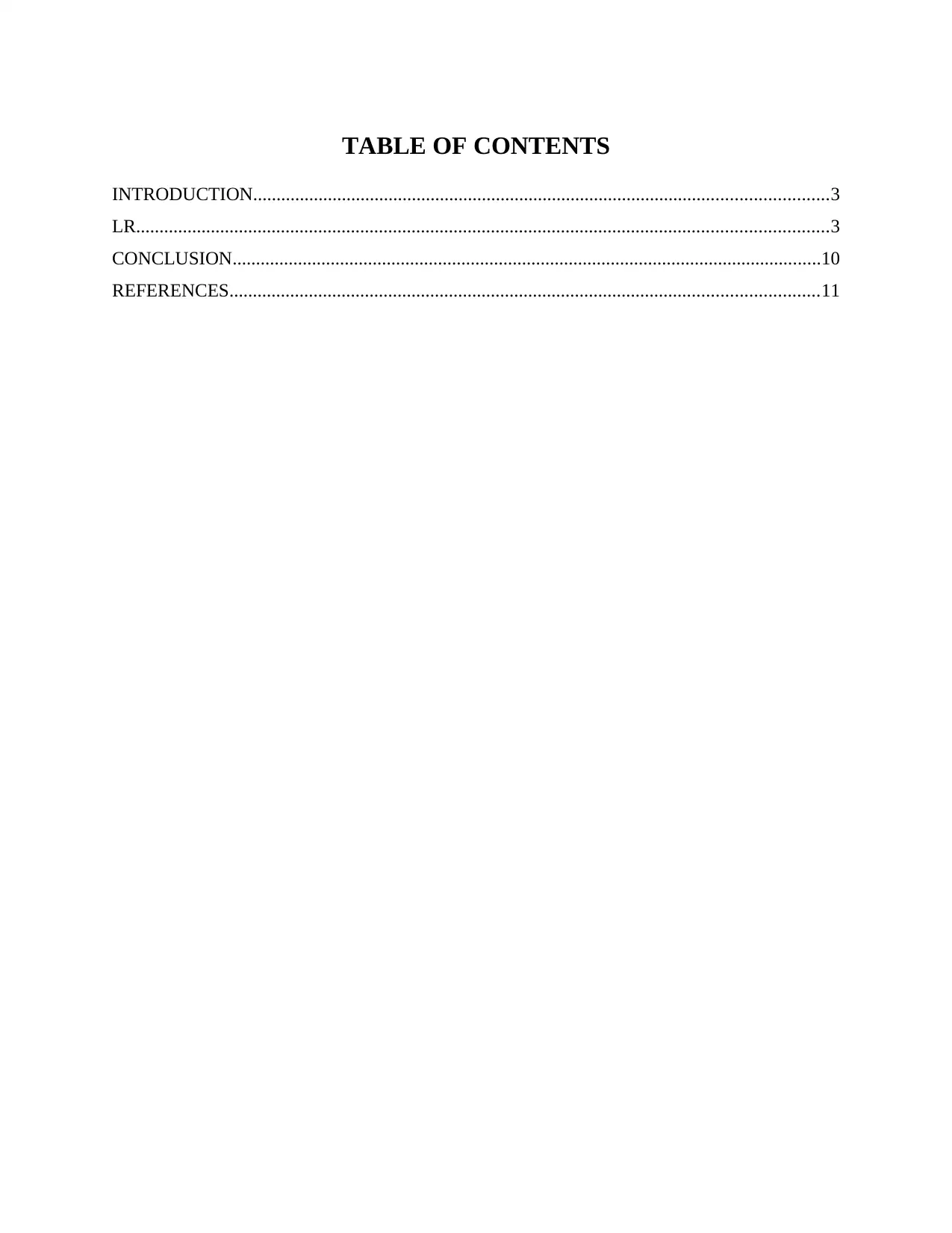
TABLE OF CONTENTS
INTRODUCTION...........................................................................................................................3
LR....................................................................................................................................................3
CONCLUSION..............................................................................................................................10
REFERENCES..............................................................................................................................11
INTRODUCTION...........................................................................................................................3
LR....................................................................................................................................................3
CONCLUSION..............................................................................................................................10
REFERENCES..............................................................................................................................11
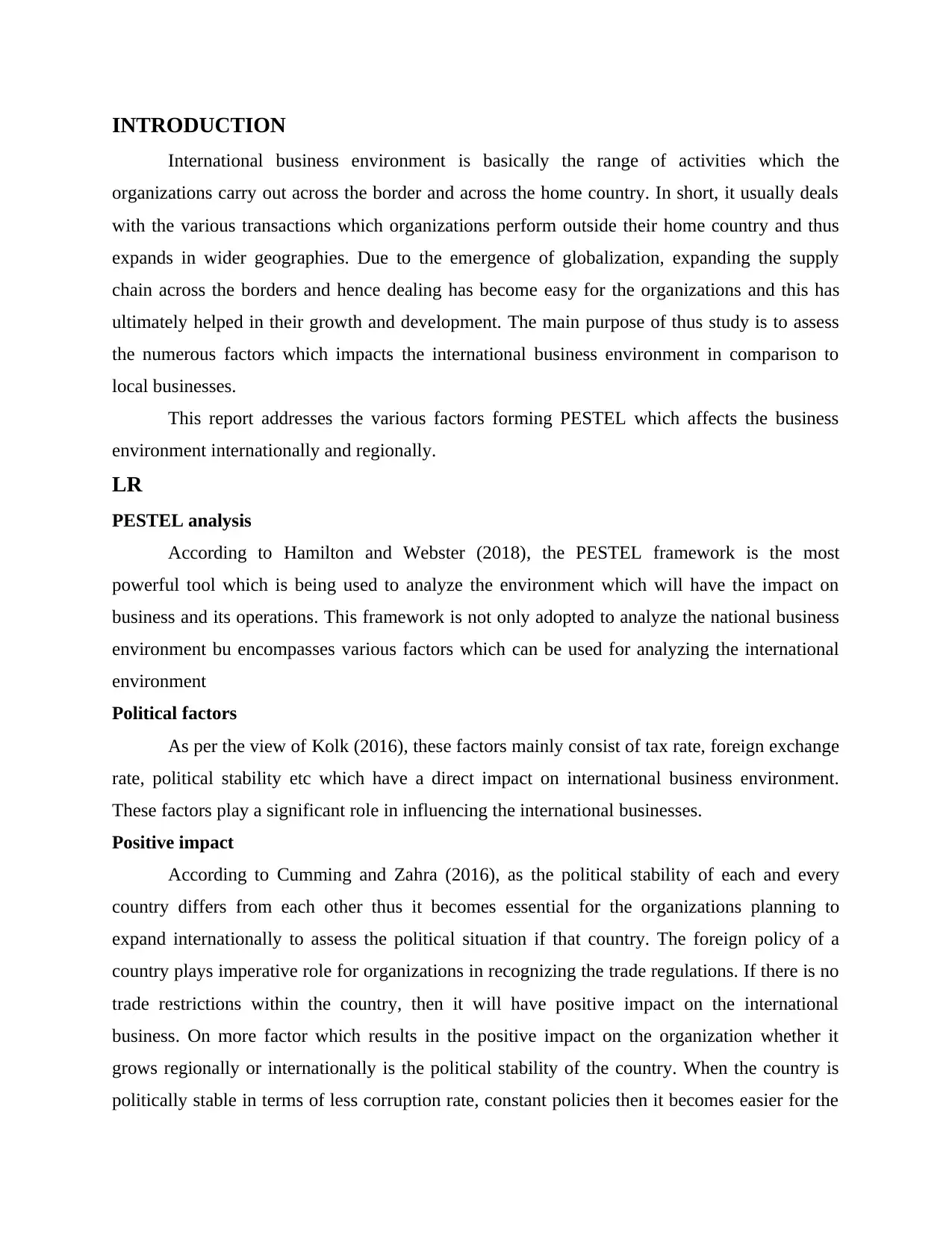
INTRODUCTION
International business environment is basically the range of activities which the
organizations carry out across the border and across the home country. In short, it usually deals
with the various transactions which organizations perform outside their home country and thus
expands in wider geographies. Due to the emergence of globalization, expanding the supply
chain across the borders and hence dealing has become easy for the organizations and this has
ultimately helped in their growth and development. The main purpose of thus study is to assess
the numerous factors which impacts the international business environment in comparison to
local businesses.
This report addresses the various factors forming PESTEL which affects the business
environment internationally and regionally.
LR
PESTEL analysis
According to Hamilton and Webster (2018), the PESTEL framework is the most
powerful tool which is being used to analyze the environment which will have the impact on
business and its operations. This framework is not only adopted to analyze the national business
environment bu encompasses various factors which can be used for analyzing the international
environment
Political factors
As per the view of Kolk (2016), these factors mainly consist of tax rate, foreign exchange
rate, political stability etc which have a direct impact on international business environment.
These factors play a significant role in influencing the international businesses.
Positive impact
According to Cumming and Zahra (2016), as the political stability of each and every
country differs from each other thus it becomes essential for the organizations planning to
expand internationally to assess the political situation if that country. The foreign policy of a
country plays imperative role for organizations in recognizing the trade regulations. If there is no
trade restrictions within the country, then it will have positive impact on the international
business. On more factor which results in the positive impact on the organization whether it
grows regionally or internationally is the political stability of the country. When the country is
politically stable in terms of less corruption rate, constant policies then it becomes easier for the
International business environment is basically the range of activities which the
organizations carry out across the border and across the home country. In short, it usually deals
with the various transactions which organizations perform outside their home country and thus
expands in wider geographies. Due to the emergence of globalization, expanding the supply
chain across the borders and hence dealing has become easy for the organizations and this has
ultimately helped in their growth and development. The main purpose of thus study is to assess
the numerous factors which impacts the international business environment in comparison to
local businesses.
This report addresses the various factors forming PESTEL which affects the business
environment internationally and regionally.
LR
PESTEL analysis
According to Hamilton and Webster (2018), the PESTEL framework is the most
powerful tool which is being used to analyze the environment which will have the impact on
business and its operations. This framework is not only adopted to analyze the national business
environment bu encompasses various factors which can be used for analyzing the international
environment
Political factors
As per the view of Kolk (2016), these factors mainly consist of tax rate, foreign exchange
rate, political stability etc which have a direct impact on international business environment.
These factors play a significant role in influencing the international businesses.
Positive impact
According to Cumming and Zahra (2016), as the political stability of each and every
country differs from each other thus it becomes essential for the organizations planning to
expand internationally to assess the political situation if that country. The foreign policy of a
country plays imperative role for organizations in recognizing the trade regulations. If there is no
trade restrictions within the country, then it will have positive impact on the international
business. On more factor which results in the positive impact on the organization whether it
grows regionally or internationally is the political stability of the country. When the country is
politically stable in terms of less corruption rate, constant policies then it becomes easier for the
⊘ This is a preview!⊘
Do you want full access?
Subscribe today to unlock all pages.

Trusted by 1+ million students worldwide
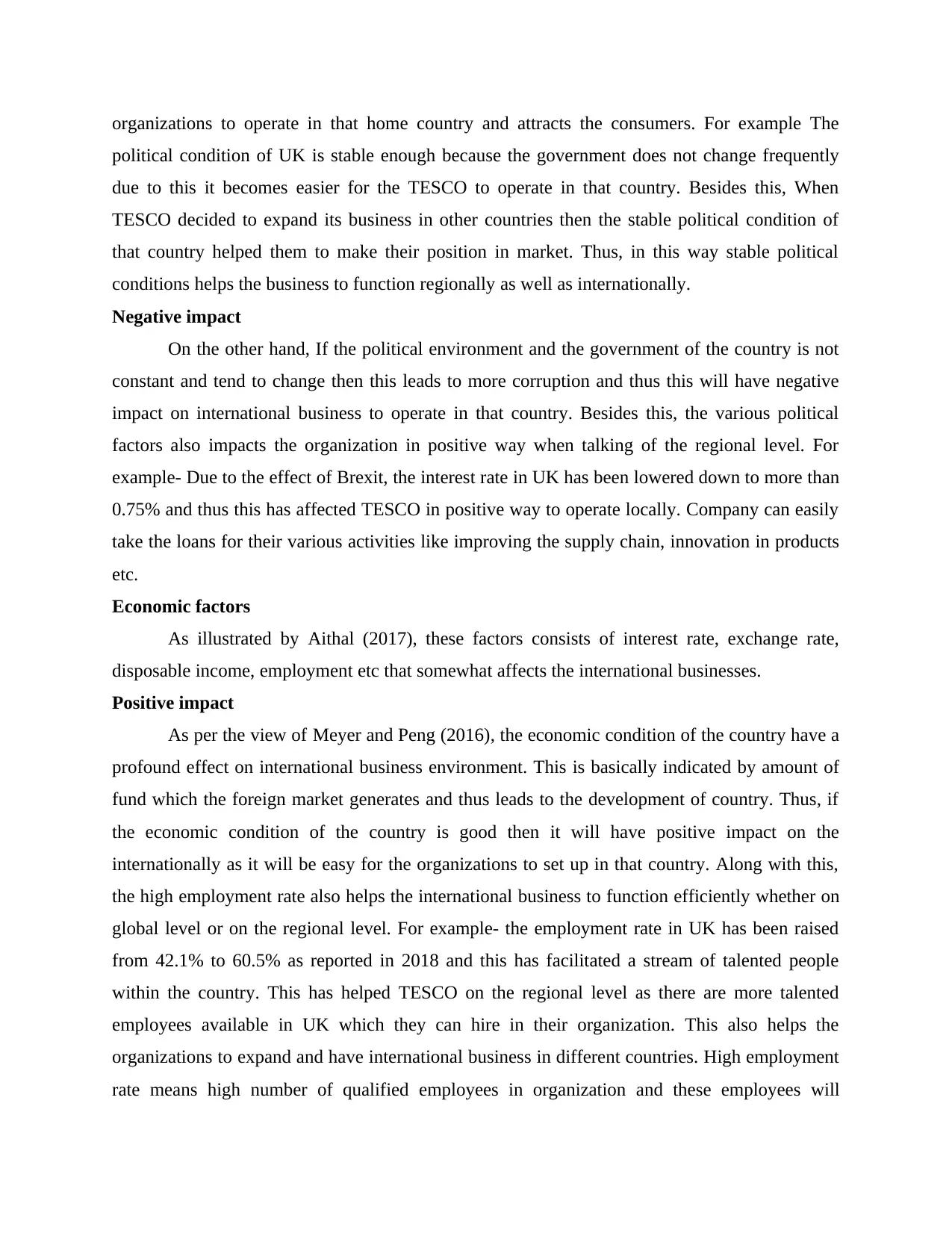
organizations to operate in that home country and attracts the consumers. For example The
political condition of UK is stable enough because the government does not change frequently
due to this it becomes easier for the TESCO to operate in that country. Besides this, When
TESCO decided to expand its business in other countries then the stable political condition of
that country helped them to make their position in market. Thus, in this way stable political
conditions helps the business to function regionally as well as internationally.
Negative impact
On the other hand, If the political environment and the government of the country is not
constant and tend to change then this leads to more corruption and thus this will have negative
impact on international business to operate in that country. Besides this, the various political
factors also impacts the organization in positive way when talking of the regional level. For
example- Due to the effect of Brexit, the interest rate in UK has been lowered down to more than
0.75% and thus this has affected TESCO in positive way to operate locally. Company can easily
take the loans for their various activities like improving the supply chain, innovation in products
etc.
Economic factors
As illustrated by Aithal (2017), these factors consists of interest rate, exchange rate,
disposable income, employment etc that somewhat affects the international businesses.
Positive impact
As per the view of Meyer and Peng (2016), the economic condition of the country have a
profound effect on international business environment. This is basically indicated by amount of
fund which the foreign market generates and thus leads to the development of country. Thus, if
the economic condition of the country is good then it will have positive impact on the
internationally as it will be easy for the organizations to set up in that country. Along with this,
the high employment rate also helps the international business to function efficiently whether on
global level or on the regional level. For example- the employment rate in UK has been raised
from 42.1% to 60.5% as reported in 2018 and this has facilitated a stream of talented people
within the country. This has helped TESCO on the regional level as there are more talented
employees available in UK which they can hire in their organization. This also helps the
organizations to expand and have international business in different countries. High employment
rate means high number of qualified employees in organization and these employees will
political condition of UK is stable enough because the government does not change frequently
due to this it becomes easier for the TESCO to operate in that country. Besides this, When
TESCO decided to expand its business in other countries then the stable political condition of
that country helped them to make their position in market. Thus, in this way stable political
conditions helps the business to function regionally as well as internationally.
Negative impact
On the other hand, If the political environment and the government of the country is not
constant and tend to change then this leads to more corruption and thus this will have negative
impact on international business to operate in that country. Besides this, the various political
factors also impacts the organization in positive way when talking of the regional level. For
example- Due to the effect of Brexit, the interest rate in UK has been lowered down to more than
0.75% and thus this has affected TESCO in positive way to operate locally. Company can easily
take the loans for their various activities like improving the supply chain, innovation in products
etc.
Economic factors
As illustrated by Aithal (2017), these factors consists of interest rate, exchange rate,
disposable income, employment etc that somewhat affects the international businesses.
Positive impact
As per the view of Meyer and Peng (2016), the economic condition of the country have a
profound effect on international business environment. This is basically indicated by amount of
fund which the foreign market generates and thus leads to the development of country. Thus, if
the economic condition of the country is good then it will have positive impact on the
internationally as it will be easy for the organizations to set up in that country. Along with this,
the high employment rate also helps the international business to function efficiently whether on
global level or on the regional level. For example- the employment rate in UK has been raised
from 42.1% to 60.5% as reported in 2018 and this has facilitated a stream of talented people
within the country. This has helped TESCO on the regional level as there are more talented
employees available in UK which they can hire in their organization. This also helps the
organizations to expand and have international business in different countries. High employment
rate means high number of qualified employees in organization and these employees will
Paraphrase This Document
Need a fresh take? Get an instant paraphrase of this document with our AI Paraphraser
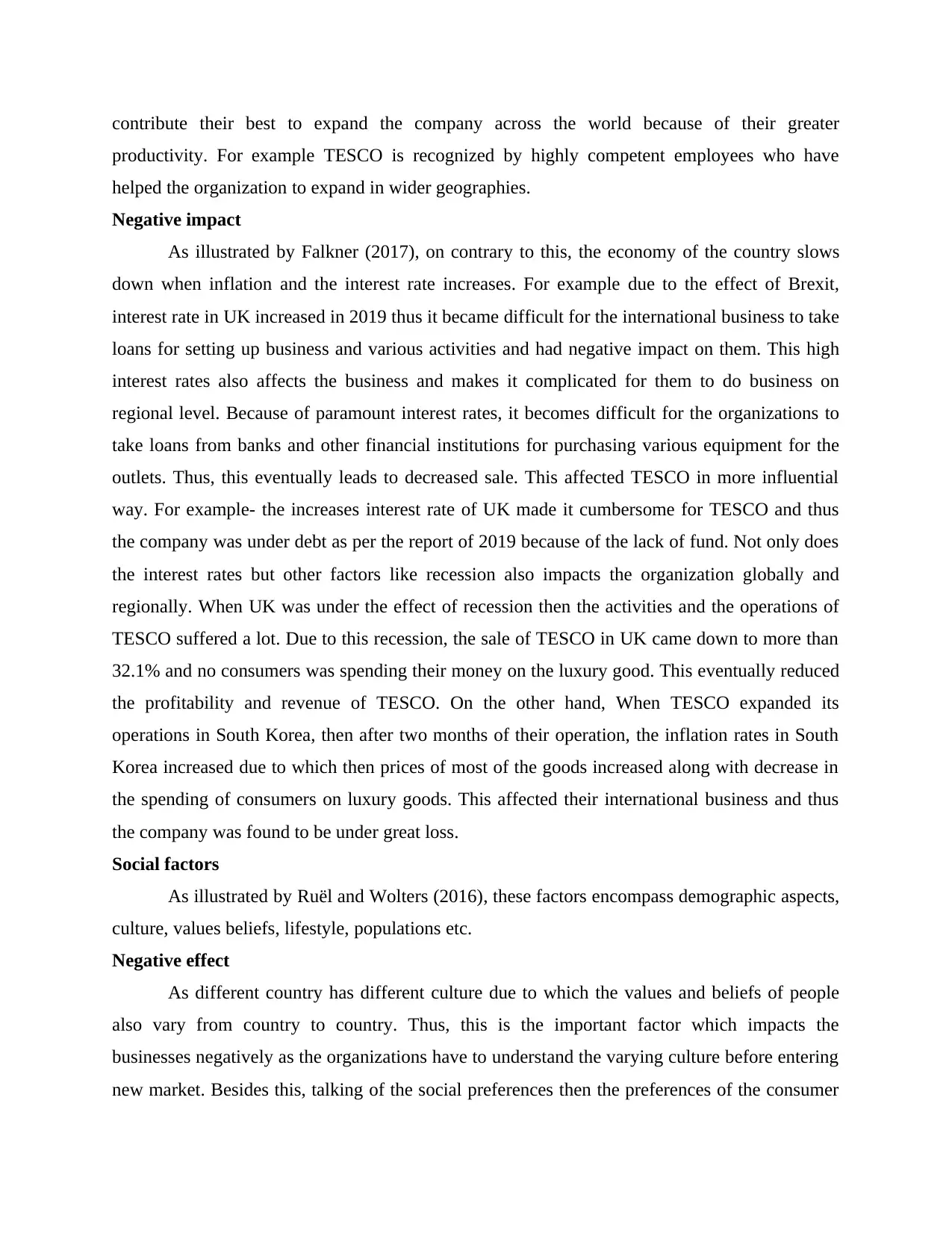
contribute their best to expand the company across the world because of their greater
productivity. For example TESCO is recognized by highly competent employees who have
helped the organization to expand in wider geographies.
Negative impact
As illustrated by Falkner (2017), on contrary to this, the economy of the country slows
down when inflation and the interest rate increases. For example due to the effect of Brexit,
interest rate in UK increased in 2019 thus it became difficult for the international business to take
loans for setting up business and various activities and had negative impact on them. This high
interest rates also affects the business and makes it complicated for them to do business on
regional level. Because of paramount interest rates, it becomes difficult for the organizations to
take loans from banks and other financial institutions for purchasing various equipment for the
outlets. Thus, this eventually leads to decreased sale. This affected TESCO in more influential
way. For example- the increases interest rate of UK made it cumbersome for TESCO and thus
the company was under debt as per the report of 2019 because of the lack of fund. Not only does
the interest rates but other factors like recession also impacts the organization globally and
regionally. When UK was under the effect of recession then the activities and the operations of
TESCO suffered a lot. Due to this recession, the sale of TESCO in UK came down to more than
32.1% and no consumers was spending their money on the luxury good. This eventually reduced
the profitability and revenue of TESCO. On the other hand, When TESCO expanded its
operations in South Korea, then after two months of their operation, the inflation rates in South
Korea increased due to which then prices of most of the goods increased along with decrease in
the spending of consumers on luxury goods. This affected their international business and thus
the company was found to be under great loss.
Social factors
As illustrated by Ruël and Wolters (2016), these factors encompass demographic aspects,
culture, values beliefs, lifestyle, populations etc.
Negative effect
As different country has different culture due to which the values and beliefs of people
also vary from country to country. Thus, this is the important factor which impacts the
businesses negatively as the organizations have to understand the varying culture before entering
new market. Besides this, talking of the social preferences then the preferences of the consumer
productivity. For example TESCO is recognized by highly competent employees who have
helped the organization to expand in wider geographies.
Negative impact
As illustrated by Falkner (2017), on contrary to this, the economy of the country slows
down when inflation and the interest rate increases. For example due to the effect of Brexit,
interest rate in UK increased in 2019 thus it became difficult for the international business to take
loans for setting up business and various activities and had negative impact on them. This high
interest rates also affects the business and makes it complicated for them to do business on
regional level. Because of paramount interest rates, it becomes difficult for the organizations to
take loans from banks and other financial institutions for purchasing various equipment for the
outlets. Thus, this eventually leads to decreased sale. This affected TESCO in more influential
way. For example- the increases interest rate of UK made it cumbersome for TESCO and thus
the company was under debt as per the report of 2019 because of the lack of fund. Not only does
the interest rates but other factors like recession also impacts the organization globally and
regionally. When UK was under the effect of recession then the activities and the operations of
TESCO suffered a lot. Due to this recession, the sale of TESCO in UK came down to more than
32.1% and no consumers was spending their money on the luxury good. This eventually reduced
the profitability and revenue of TESCO. On the other hand, When TESCO expanded its
operations in South Korea, then after two months of their operation, the inflation rates in South
Korea increased due to which then prices of most of the goods increased along with decrease in
the spending of consumers on luxury goods. This affected their international business and thus
the company was found to be under great loss.
Social factors
As illustrated by Ruël and Wolters (2016), these factors encompass demographic aspects,
culture, values beliefs, lifestyle, populations etc.
Negative effect
As different country has different culture due to which the values and beliefs of people
also vary from country to country. Thus, this is the important factor which impacts the
businesses negatively as the organizations have to understand the varying culture before entering
new market. Besides this, talking of the social preferences then the preferences of the consumer
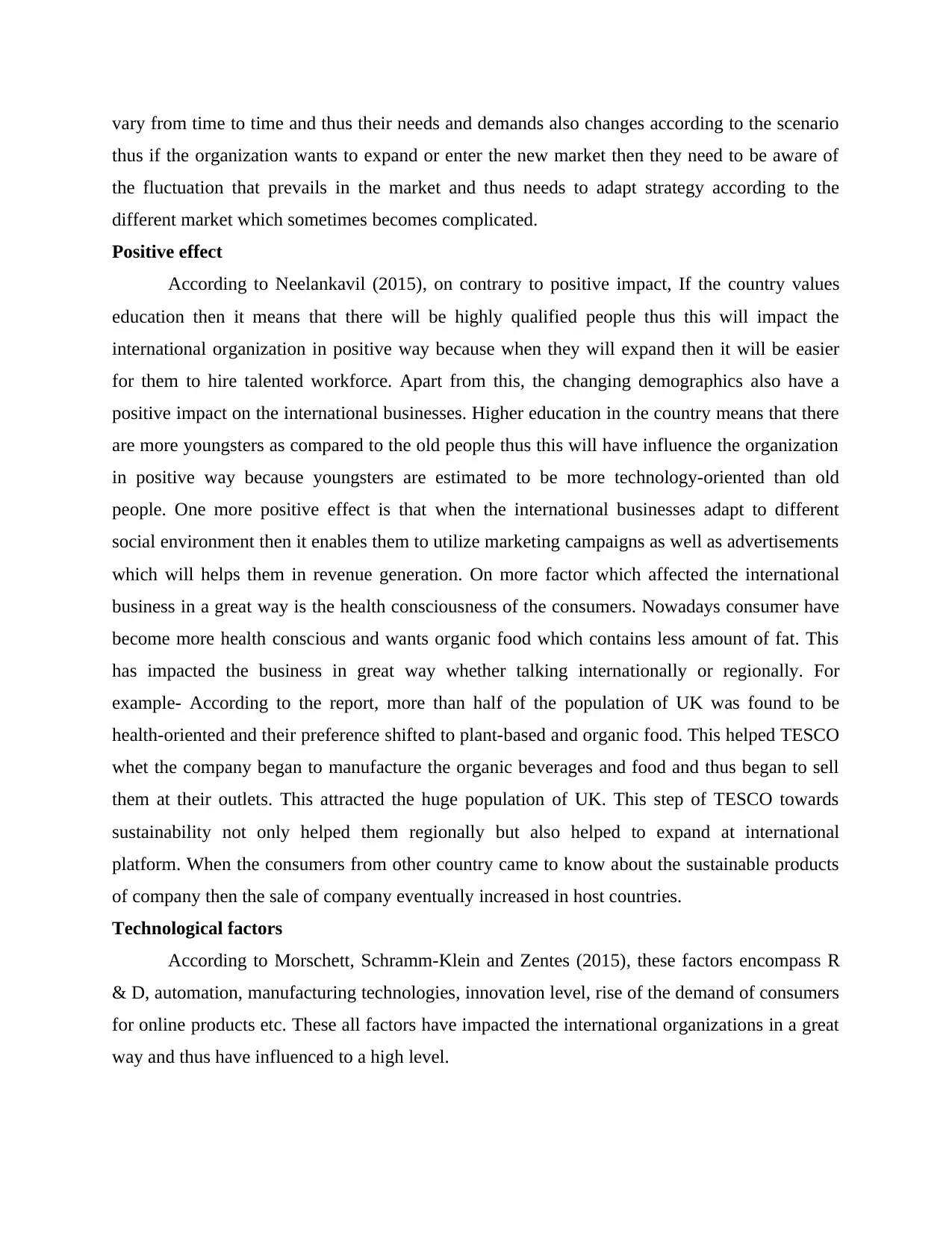
vary from time to time and thus their needs and demands also changes according to the scenario
thus if the organization wants to expand or enter the new market then they need to be aware of
the fluctuation that prevails in the market and thus needs to adapt strategy according to the
different market which sometimes becomes complicated.
Positive effect
According to Neelankavil (2015), on contrary to positive impact, If the country values
education then it means that there will be highly qualified people thus this will impact the
international organization in positive way because when they will expand then it will be easier
for them to hire talented workforce. Apart from this, the changing demographics also have a
positive impact on the international businesses. Higher education in the country means that there
are more youngsters as compared to the old people thus this will have influence the organization
in positive way because youngsters are estimated to be more technology-oriented than old
people. One more positive effect is that when the international businesses adapt to different
social environment then it enables them to utilize marketing campaigns as well as advertisements
which will helps them in revenue generation. On more factor which affected the international
business in a great way is the health consciousness of the consumers. Nowadays consumer have
become more health conscious and wants organic food which contains less amount of fat. This
has impacted the business in great way whether talking internationally or regionally. For
example- According to the report, more than half of the population of UK was found to be
health-oriented and their preference shifted to plant-based and organic food. This helped TESCO
whet the company began to manufacture the organic beverages and food and thus began to sell
them at their outlets. This attracted the huge population of UK. This step of TESCO towards
sustainability not only helped them regionally but also helped to expand at international
platform. When the consumers from other country came to know about the sustainable products
of company then the sale of company eventually increased in host countries.
Technological factors
According to Morschett, Schramm-Klein and Zentes (2015), these factors encompass R
& D, automation, manufacturing technologies, innovation level, rise of the demand of consumers
for online products etc. These all factors have impacted the international organizations in a great
way and thus have influenced to a high level.
thus if the organization wants to expand or enter the new market then they need to be aware of
the fluctuation that prevails in the market and thus needs to adapt strategy according to the
different market which sometimes becomes complicated.
Positive effect
According to Neelankavil (2015), on contrary to positive impact, If the country values
education then it means that there will be highly qualified people thus this will impact the
international organization in positive way because when they will expand then it will be easier
for them to hire talented workforce. Apart from this, the changing demographics also have a
positive impact on the international businesses. Higher education in the country means that there
are more youngsters as compared to the old people thus this will have influence the organization
in positive way because youngsters are estimated to be more technology-oriented than old
people. One more positive effect is that when the international businesses adapt to different
social environment then it enables them to utilize marketing campaigns as well as advertisements
which will helps them in revenue generation. On more factor which affected the international
business in a great way is the health consciousness of the consumers. Nowadays consumer have
become more health conscious and wants organic food which contains less amount of fat. This
has impacted the business in great way whether talking internationally or regionally. For
example- According to the report, more than half of the population of UK was found to be
health-oriented and their preference shifted to plant-based and organic food. This helped TESCO
whet the company began to manufacture the organic beverages and food and thus began to sell
them at their outlets. This attracted the huge population of UK. This step of TESCO towards
sustainability not only helped them regionally but also helped to expand at international
platform. When the consumers from other country came to know about the sustainable products
of company then the sale of company eventually increased in host countries.
Technological factors
According to Morschett, Schramm-Klein and Zentes (2015), these factors encompass R
& D, automation, manufacturing technologies, innovation level, rise of the demand of consumers
for online products etc. These all factors have impacted the international organizations in a great
way and thus have influenced to a high level.
⊘ This is a preview!⊘
Do you want full access?
Subscribe today to unlock all pages.

Trusted by 1+ million students worldwide
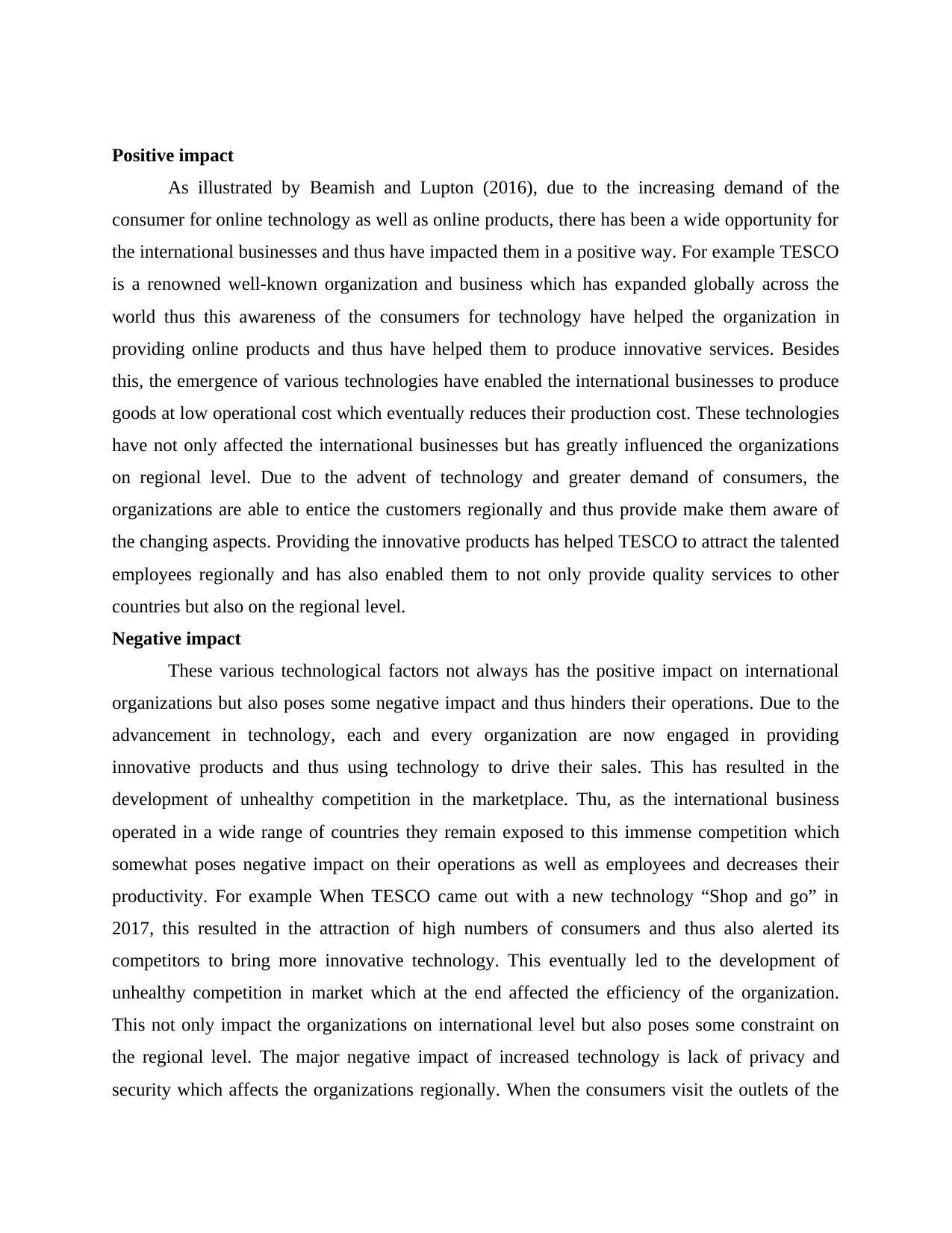
Positive impact
As illustrated by Beamish and Lupton (2016), due to the increasing demand of the
consumer for online technology as well as online products, there has been a wide opportunity for
the international businesses and thus have impacted them in a positive way. For example TESCO
is a renowned well-known organization and business which has expanded globally across the
world thus this awareness of the consumers for technology have helped the organization in
providing online products and thus have helped them to produce innovative services. Besides
this, the emergence of various technologies have enabled the international businesses to produce
goods at low operational cost which eventually reduces their production cost. These technologies
have not only affected the international businesses but has greatly influenced the organizations
on regional level. Due to the advent of technology and greater demand of consumers, the
organizations are able to entice the customers regionally and thus provide make them aware of
the changing aspects. Providing the innovative products has helped TESCO to attract the talented
employees regionally and has also enabled them to not only provide quality services to other
countries but also on the regional level.
Negative impact
These various technological factors not always has the positive impact on international
organizations but also poses some negative impact and thus hinders their operations. Due to the
advancement in technology, each and every organization are now engaged in providing
innovative products and thus using technology to drive their sales. This has resulted in the
development of unhealthy competition in the marketplace. Thu, as the international business
operated in a wide range of countries they remain exposed to this immense competition which
somewhat poses negative impact on their operations as well as employees and decreases their
productivity. For example When TESCO came out with a new technology “Shop and go” in
2017, this resulted in the attraction of high numbers of consumers and thus also alerted its
competitors to bring more innovative technology. This eventually led to the development of
unhealthy competition in market which at the end affected the efficiency of the organization.
This not only impact the organizations on international level but also poses some constraint on
the regional level. The major negative impact of increased technology is lack of privacy and
security which affects the organizations regionally. When the consumers visit the outlets of the
As illustrated by Beamish and Lupton (2016), due to the increasing demand of the
consumer for online technology as well as online products, there has been a wide opportunity for
the international businesses and thus have impacted them in a positive way. For example TESCO
is a renowned well-known organization and business which has expanded globally across the
world thus this awareness of the consumers for technology have helped the organization in
providing online products and thus have helped them to produce innovative services. Besides
this, the emergence of various technologies have enabled the international businesses to produce
goods at low operational cost which eventually reduces their production cost. These technologies
have not only affected the international businesses but has greatly influenced the organizations
on regional level. Due to the advent of technology and greater demand of consumers, the
organizations are able to entice the customers regionally and thus provide make them aware of
the changing aspects. Providing the innovative products has helped TESCO to attract the talented
employees regionally and has also enabled them to not only provide quality services to other
countries but also on the regional level.
Negative impact
These various technological factors not always has the positive impact on international
organizations but also poses some negative impact and thus hinders their operations. Due to the
advancement in technology, each and every organization are now engaged in providing
innovative products and thus using technology to drive their sales. This has resulted in the
development of unhealthy competition in the marketplace. Thu, as the international business
operated in a wide range of countries they remain exposed to this immense competition which
somewhat poses negative impact on their operations as well as employees and decreases their
productivity. For example When TESCO came out with a new technology “Shop and go” in
2017, this resulted in the attraction of high numbers of consumers and thus also alerted its
competitors to bring more innovative technology. This eventually led to the development of
unhealthy competition in market which at the end affected the efficiency of the organization.
This not only impact the organizations on international level but also poses some constraint on
the regional level. The major negative impact of increased technology is lack of privacy and
security which affects the organizations regionally. When the consumers visit the outlets of the
Paraphrase This Document
Need a fresh take? Get an instant paraphrase of this document with our AI Paraphraser
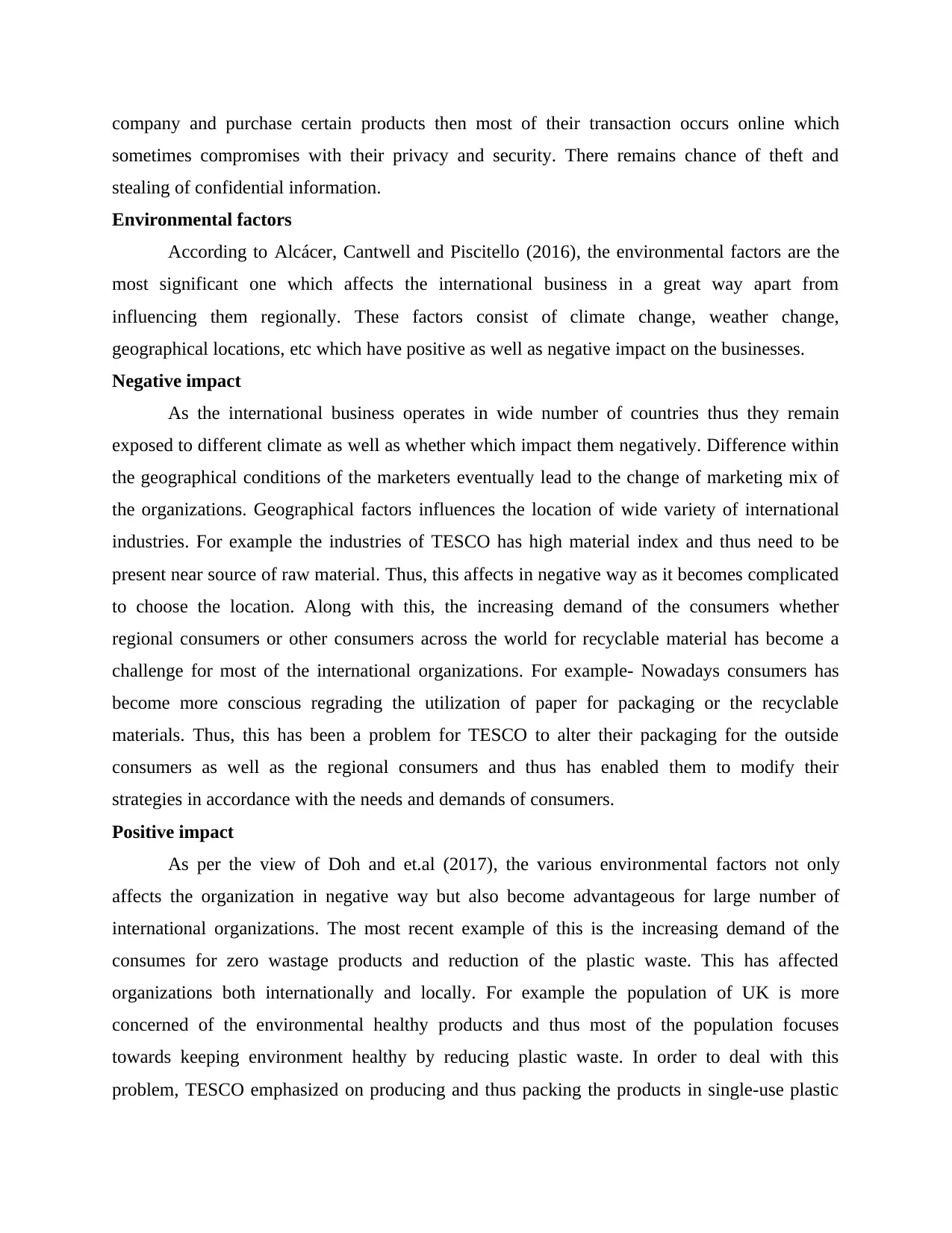
company and purchase certain products then most of their transaction occurs online which
sometimes compromises with their privacy and security. There remains chance of theft and
stealing of confidential information.
Environmental factors
According to Alcácer, Cantwell and Piscitello (2016), the environmental factors are the
most significant one which affects the international business in a great way apart from
influencing them regionally. These factors consist of climate change, weather change,
geographical locations, etc which have positive as well as negative impact on the businesses.
Negative impact
As the international business operates in wide number of countries thus they remain
exposed to different climate as well as whether which impact them negatively. Difference within
the geographical conditions of the marketers eventually lead to the change of marketing mix of
the organizations. Geographical factors influences the location of wide variety of international
industries. For example the industries of TESCO has high material index and thus need to be
present near source of raw material. Thus, this affects in negative way as it becomes complicated
to choose the location. Along with this, the increasing demand of the consumers whether
regional consumers or other consumers across the world for recyclable material has become a
challenge for most of the international organizations. For example- Nowadays consumers has
become more conscious regrading the utilization of paper for packaging or the recyclable
materials. Thus, this has been a problem for TESCO to alter their packaging for the outside
consumers as well as the regional consumers and thus has enabled them to modify their
strategies in accordance with the needs and demands of consumers.
Positive impact
As per the view of Doh and et.al (2017), the various environmental factors not only
affects the organization in negative way but also become advantageous for large number of
international organizations. The most recent example of this is the increasing demand of the
consumes for zero wastage products and reduction of the plastic waste. This has affected
organizations both internationally and locally. For example the population of UK is more
concerned of the environmental healthy products and thus most of the population focuses
towards keeping environment healthy by reducing plastic waste. In order to deal with this
problem, TESCO emphasized on producing and thus packing the products in single-use plastic
sometimes compromises with their privacy and security. There remains chance of theft and
stealing of confidential information.
Environmental factors
According to Alcácer, Cantwell and Piscitello (2016), the environmental factors are the
most significant one which affects the international business in a great way apart from
influencing them regionally. These factors consist of climate change, weather change,
geographical locations, etc which have positive as well as negative impact on the businesses.
Negative impact
As the international business operates in wide number of countries thus they remain
exposed to different climate as well as whether which impact them negatively. Difference within
the geographical conditions of the marketers eventually lead to the change of marketing mix of
the organizations. Geographical factors influences the location of wide variety of international
industries. For example the industries of TESCO has high material index and thus need to be
present near source of raw material. Thus, this affects in negative way as it becomes complicated
to choose the location. Along with this, the increasing demand of the consumers whether
regional consumers or other consumers across the world for recyclable material has become a
challenge for most of the international organizations. For example- Nowadays consumers has
become more conscious regrading the utilization of paper for packaging or the recyclable
materials. Thus, this has been a problem for TESCO to alter their packaging for the outside
consumers as well as the regional consumers and thus has enabled them to modify their
strategies in accordance with the needs and demands of consumers.
Positive impact
As per the view of Doh and et.al (2017), the various environmental factors not only
affects the organization in negative way but also become advantageous for large number of
international organizations. The most recent example of this is the increasing demand of the
consumes for zero wastage products and reduction of the plastic waste. This has affected
organizations both internationally and locally. For example the population of UK is more
concerned of the environmental healthy products and thus most of the population focuses
towards keeping environment healthy by reducing plastic waste. In order to deal with this
problem, TESCO emphasized on producing and thus packing the products in single-use plastic
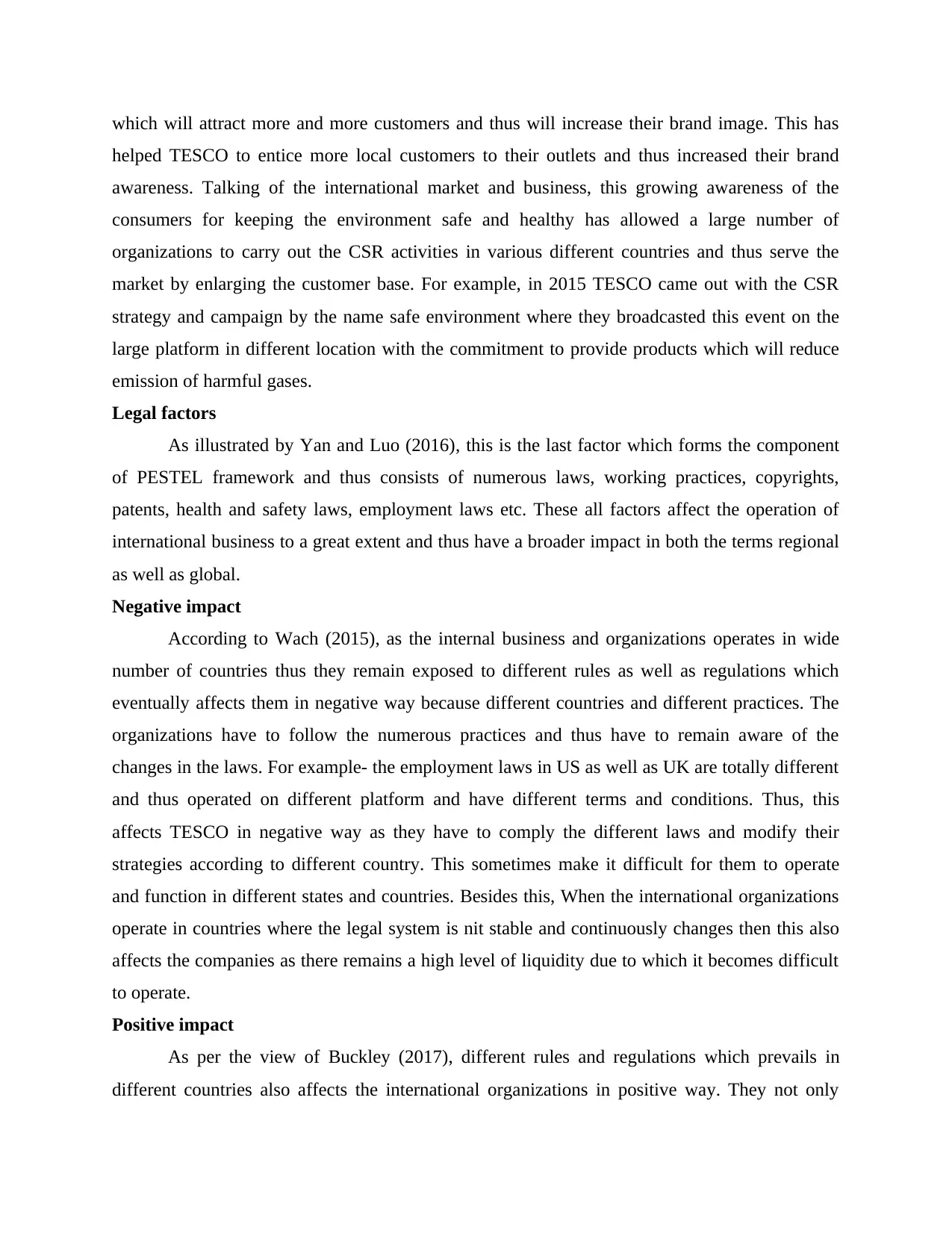
which will attract more and more customers and thus will increase their brand image. This has
helped TESCO to entice more local customers to their outlets and thus increased their brand
awareness. Talking of the international market and business, this growing awareness of the
consumers for keeping the environment safe and healthy has allowed a large number of
organizations to carry out the CSR activities in various different countries and thus serve the
market by enlarging the customer base. For example, in 2015 TESCO came out with the CSR
strategy and campaign by the name safe environment where they broadcasted this event on the
large platform in different location with the commitment to provide products which will reduce
emission of harmful gases.
Legal factors
As illustrated by Yan and Luo (2016), this is the last factor which forms the component
of PESTEL framework and thus consists of numerous laws, working practices, copyrights,
patents, health and safety laws, employment laws etc. These all factors affect the operation of
international business to a great extent and thus have a broader impact in both the terms regional
as well as global.
Negative impact
According to Wach (2015), as the internal business and organizations operates in wide
number of countries thus they remain exposed to different rules as well as regulations which
eventually affects them in negative way because different countries and different practices. The
organizations have to follow the numerous practices and thus have to remain aware of the
changes in the laws. For example- the employment laws in US as well as UK are totally different
and thus operated on different platform and have different terms and conditions. Thus, this
affects TESCO in negative way as they have to comply the different laws and modify their
strategies according to different country. This sometimes make it difficult for them to operate
and function in different states and countries. Besides this, When the international organizations
operate in countries where the legal system is nit stable and continuously changes then this also
affects the companies as there remains a high level of liquidity due to which it becomes difficult
to operate.
Positive impact
As per the view of Buckley (2017), different rules and regulations which prevails in
different countries also affects the international organizations in positive way. They not only
helped TESCO to entice more local customers to their outlets and thus increased their brand
awareness. Talking of the international market and business, this growing awareness of the
consumers for keeping the environment safe and healthy has allowed a large number of
organizations to carry out the CSR activities in various different countries and thus serve the
market by enlarging the customer base. For example, in 2015 TESCO came out with the CSR
strategy and campaign by the name safe environment where they broadcasted this event on the
large platform in different location with the commitment to provide products which will reduce
emission of harmful gases.
Legal factors
As illustrated by Yan and Luo (2016), this is the last factor which forms the component
of PESTEL framework and thus consists of numerous laws, working practices, copyrights,
patents, health and safety laws, employment laws etc. These all factors affect the operation of
international business to a great extent and thus have a broader impact in both the terms regional
as well as global.
Negative impact
According to Wach (2015), as the internal business and organizations operates in wide
number of countries thus they remain exposed to different rules as well as regulations which
eventually affects them in negative way because different countries and different practices. The
organizations have to follow the numerous practices and thus have to remain aware of the
changes in the laws. For example- the employment laws in US as well as UK are totally different
and thus operated on different platform and have different terms and conditions. Thus, this
affects TESCO in negative way as they have to comply the different laws and modify their
strategies according to different country. This sometimes make it difficult for them to operate
and function in different states and countries. Besides this, When the international organizations
operate in countries where the legal system is nit stable and continuously changes then this also
affects the companies as there remains a high level of liquidity due to which it becomes difficult
to operate.
Positive impact
As per the view of Buckley (2017), different rules and regulations which prevails in
different countries also affects the international organizations in positive way. They not only
⊘ This is a preview!⊘
Do you want full access?
Subscribe today to unlock all pages.

Trusted by 1+ million students worldwide
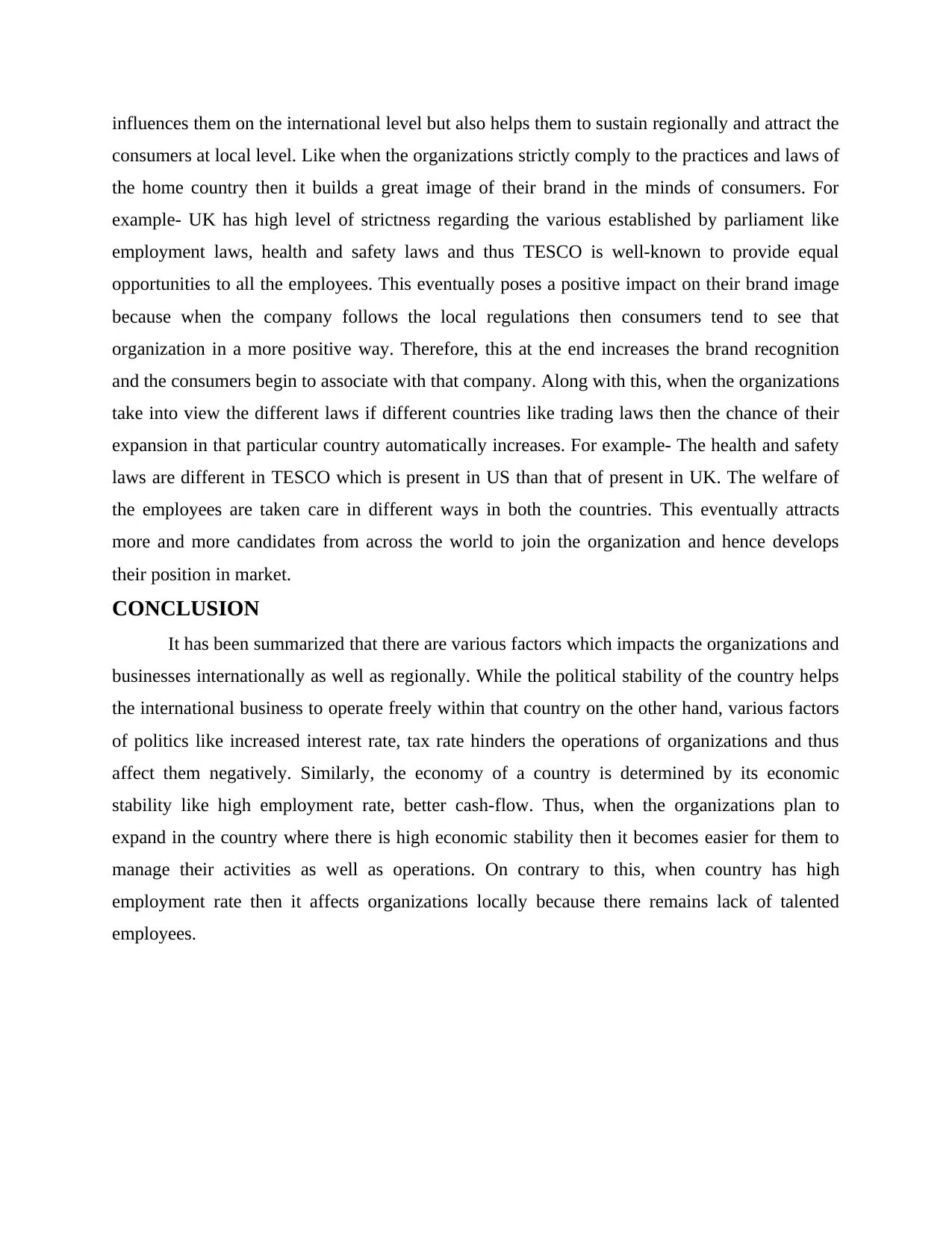
influences them on the international level but also helps them to sustain regionally and attract the
consumers at local level. Like when the organizations strictly comply to the practices and laws of
the home country then it builds a great image of their brand in the minds of consumers. For
example- UK has high level of strictness regarding the various established by parliament like
employment laws, health and safety laws and thus TESCO is well-known to provide equal
opportunities to all the employees. This eventually poses a positive impact on their brand image
because when the company follows the local regulations then consumers tend to see that
organization in a more positive way. Therefore, this at the end increases the brand recognition
and the consumers begin to associate with that company. Along with this, when the organizations
take into view the different laws if different countries like trading laws then the chance of their
expansion in that particular country automatically increases. For example- The health and safety
laws are different in TESCO which is present in US than that of present in UK. The welfare of
the employees are taken care in different ways in both the countries. This eventually attracts
more and more candidates from across the world to join the organization and hence develops
their position in market.
CONCLUSION
It has been summarized that there are various factors which impacts the organizations and
businesses internationally as well as regionally. While the political stability of the country helps
the international business to operate freely within that country on the other hand, various factors
of politics like increased interest rate, tax rate hinders the operations of organizations and thus
affect them negatively. Similarly, the economy of a country is determined by its economic
stability like high employment rate, better cash-flow. Thus, when the organizations plan to
expand in the country where there is high economic stability then it becomes easier for them to
manage their activities as well as operations. On contrary to this, when country has high
employment rate then it affects organizations locally because there remains lack of talented
employees.
consumers at local level. Like when the organizations strictly comply to the practices and laws of
the home country then it builds a great image of their brand in the minds of consumers. For
example- UK has high level of strictness regarding the various established by parliament like
employment laws, health and safety laws and thus TESCO is well-known to provide equal
opportunities to all the employees. This eventually poses a positive impact on their brand image
because when the company follows the local regulations then consumers tend to see that
organization in a more positive way. Therefore, this at the end increases the brand recognition
and the consumers begin to associate with that company. Along with this, when the organizations
take into view the different laws if different countries like trading laws then the chance of their
expansion in that particular country automatically increases. For example- The health and safety
laws are different in TESCO which is present in US than that of present in UK. The welfare of
the employees are taken care in different ways in both the countries. This eventually attracts
more and more candidates from across the world to join the organization and hence develops
their position in market.
CONCLUSION
It has been summarized that there are various factors which impacts the organizations and
businesses internationally as well as regionally. While the political stability of the country helps
the international business to operate freely within that country on the other hand, various factors
of politics like increased interest rate, tax rate hinders the operations of organizations and thus
affect them negatively. Similarly, the economy of a country is determined by its economic
stability like high employment rate, better cash-flow. Thus, when the organizations plan to
expand in the country where there is high economic stability then it becomes easier for them to
manage their activities as well as operations. On contrary to this, when country has high
employment rate then it affects organizations locally because there remains lack of talented
employees.
Paraphrase This Document
Need a fresh take? Get an instant paraphrase of this document with our AI Paraphraser
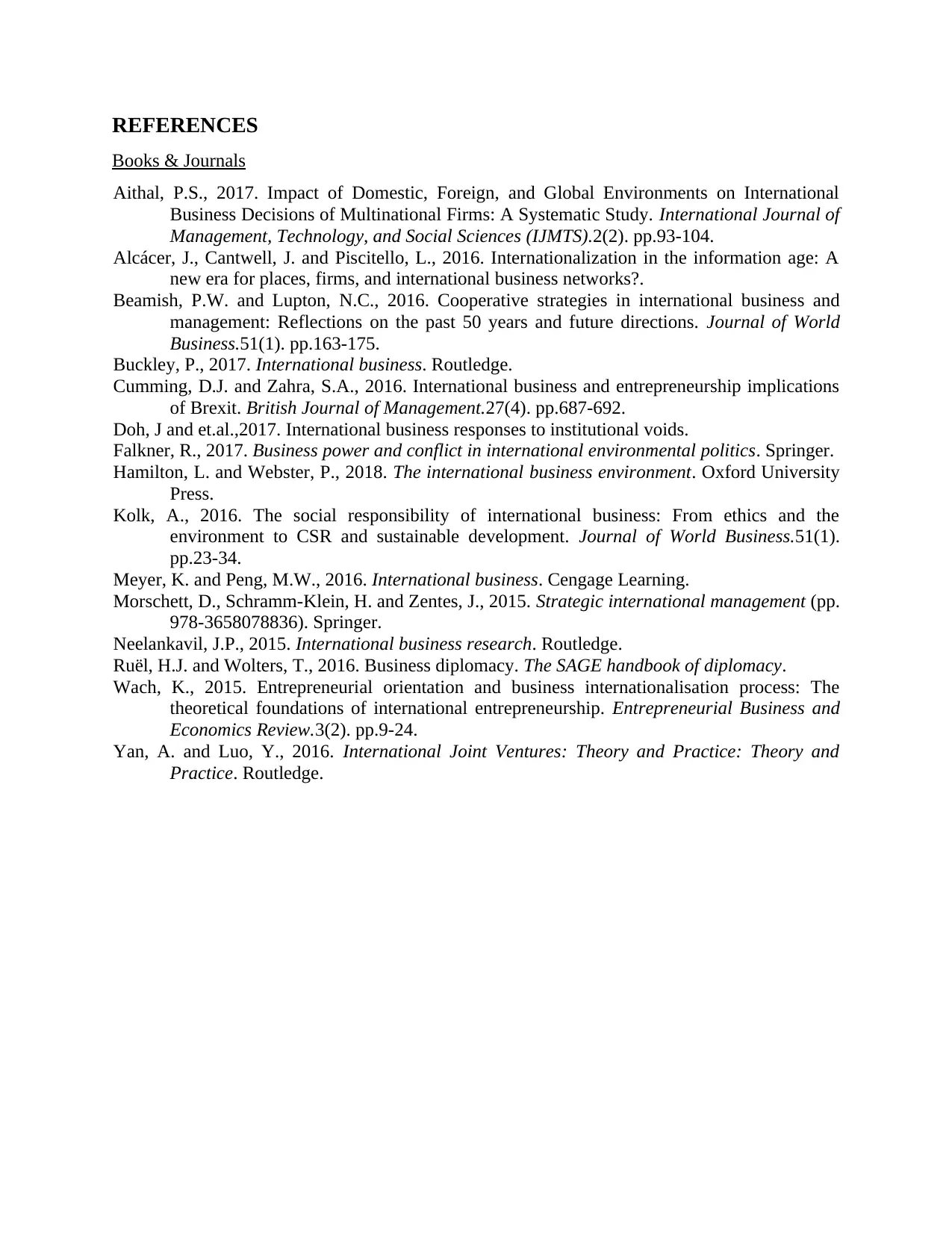
REFERENCES
Books & Journals
Aithal, P.S., 2017. Impact of Domestic, Foreign, and Global Environments on International
Business Decisions of Multinational Firms: A Systematic Study. International Journal of
Management, Technology, and Social Sciences (IJMTS).2(2). pp.93-104.
Alcácer, J., Cantwell, J. and Piscitello, L., 2016. Internationalization in the information age: A
new era for places, firms, and international business networks?.
Beamish, P.W. and Lupton, N.C., 2016. Cooperative strategies in international business and
management: Reflections on the past 50 years and future directions. Journal of World
Business.51(1). pp.163-175.
Buckley, P., 2017. International business. Routledge.
Cumming, D.J. and Zahra, S.A., 2016. International business and entrepreneurship implications
of Brexit. British Journal of Management.27(4). pp.687-692.
Doh, J and et.al.,2017. International business responses to institutional voids.
Falkner, R., 2017. Business power and conflict in international environmental politics. Springer.
Hamilton, L. and Webster, P., 2018. The international business environment. Oxford University
Press.
Kolk, A., 2016. The social responsibility of international business: From ethics and the
environment to CSR and sustainable development. Journal of World Business.51(1).
pp.23-34.
Meyer, K. and Peng, M.W., 2016. International business. Cengage Learning.
Morschett, D., Schramm-Klein, H. and Zentes, J., 2015. Strategic international management (pp.
978-3658078836). Springer.
Neelankavil, J.P., 2015. International business research. Routledge.
Ruël, H.J. and Wolters, T., 2016. Business diplomacy. The SAGE handbook of diplomacy.
Wach, K., 2015. Entrepreneurial orientation and business internationalisation process: The
theoretical foundations of international entrepreneurship. Entrepreneurial Business and
Economics Review.3(2). pp.9-24.
Yan, A. and Luo, Y., 2016. International Joint Ventures: Theory and Practice: Theory and
Practice. Routledge.
Books & Journals
Aithal, P.S., 2017. Impact of Domestic, Foreign, and Global Environments on International
Business Decisions of Multinational Firms: A Systematic Study. International Journal of
Management, Technology, and Social Sciences (IJMTS).2(2). pp.93-104.
Alcácer, J., Cantwell, J. and Piscitello, L., 2016. Internationalization in the information age: A
new era for places, firms, and international business networks?.
Beamish, P.W. and Lupton, N.C., 2016. Cooperative strategies in international business and
management: Reflections on the past 50 years and future directions. Journal of World
Business.51(1). pp.163-175.
Buckley, P., 2017. International business. Routledge.
Cumming, D.J. and Zahra, S.A., 2016. International business and entrepreneurship implications
of Brexit. British Journal of Management.27(4). pp.687-692.
Doh, J and et.al.,2017. International business responses to institutional voids.
Falkner, R., 2017. Business power and conflict in international environmental politics. Springer.
Hamilton, L. and Webster, P., 2018. The international business environment. Oxford University
Press.
Kolk, A., 2016. The social responsibility of international business: From ethics and the
environment to CSR and sustainable development. Journal of World Business.51(1).
pp.23-34.
Meyer, K. and Peng, M.W., 2016. International business. Cengage Learning.
Morschett, D., Schramm-Klein, H. and Zentes, J., 2015. Strategic international management (pp.
978-3658078836). Springer.
Neelankavil, J.P., 2015. International business research. Routledge.
Ruël, H.J. and Wolters, T., 2016. Business diplomacy. The SAGE handbook of diplomacy.
Wach, K., 2015. Entrepreneurial orientation and business internationalisation process: The
theoretical foundations of international entrepreneurship. Entrepreneurial Business and
Economics Review.3(2). pp.9-24.
Yan, A. and Luo, Y., 2016. International Joint Ventures: Theory and Practice: Theory and
Practice. Routledge.

⊘ This is a preview!⊘
Do you want full access?
Subscribe today to unlock all pages.

Trusted by 1+ million students worldwide
1 out of 12
Related Documents
Your All-in-One AI-Powered Toolkit for Academic Success.
+13062052269
info@desklib.com
Available 24*7 on WhatsApp / Email
![[object Object]](/_next/static/media/star-bottom.7253800d.svg)
Unlock your academic potential
Copyright © 2020–2026 A2Z Services. All Rights Reserved. Developed and managed by ZUCOL.




